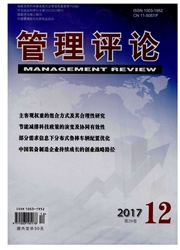

 中文摘要:
中文摘要:
本文旨在研究风险可评估性对决策者主观风险感知过程和结果影响的机制。根据风险即感觉假说和情绪启发式模型,构建了风险可评估性、分析型风险、感觉型风险和总体感知风险之间的结构方程模型。针对在校大学生对就业风险感知的实证研究表明:(1)决策者的总体感知风险中包括了相对理性的分析型风险和相对感性的感觉型风险。(2)风险可评估性会影响决策者的风险感知:风险可评估性和分析型风险与感觉型风险结果之间都存在着显著的负相关关系;风险可评估性的提高会降低感觉型风险结果与决策者总体感知风险之间的联系。基于这些结论,本文对如何影响决策者的感知风险提出了建议,并指出了进一步的研究方向。
 英文摘要:
英文摘要:
This paper aims to explore the mechanism of the effect of risk evaluabiliy on the process and results of decision-maker's subjective risk perception. Mainly based on the risk as feelings hypothesis and the affect heuristic model, a structured equation model comprised of risk evaluability, risk as analysis, risk as feelings and general perceived risk is constructed. With the data collected form the views of college students about employment risk, an empirical study is conducted. The results show that both the relatively rational risk as analysis and the relatively intuitive risk as feelings have significant impact on the general perceived risk. Furthermore, we show that the risk evaluability can affect risk perception. That is, the risk evaluability has a negatively impact on both results of risk as analysis and risk as feelings, while the higher risk evaluability may decrease the weight of risk as feelings in the decider's general perceived risk. According to these conclusions, some suggestions are presented for affecting the lay people's perceived risk, and research directions for future are also recommended.
 同期刊论文项目
同期刊论文项目
 同项目期刊论文
同项目期刊论文
 期刊信息
期刊信息
